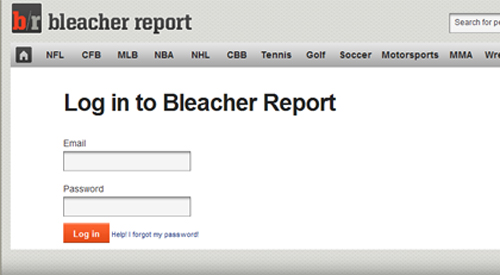
Can Bleacher Report be saved?
If you want to write for Bleacher Report these days, you have to apply to get in. The internet’s most infamous sports writing website, the one that was supposed to liberate sports media and turn the opinion pages to the fans, now requires an application. It’s not going to save the site’s reputation, but it’s a great first step.
Bleacher Report is probably best known for it’s many gaffes and mistakes, for articles which either have no grounding in fact or are little more than a dressed-up rant.
Less cynical people may also take note of the site’s copious use of slideshows, slideshows for every topic, so many slideshows you’ll drop to the floor as your body rejects the sheer number of pictures of Ben Roethlisberger. That’s the Bleacher Report cliche and the reason there’s Twitter memes like #BRShakespeare. Bleacher Report may not be entirely awful, but it’s worst examples certainly are – and this lack of credibility is their biggest problem.
So it makes sense that the website is making changes to improve it’s image. Having to apply is one. Another would be the hiring of King Kaufman, formerly of Salon, as head of writer development. Kaufman is a former editor on Salon and once upon a time he wrote a daily sports column. He’s a real grab for the website – he’s a heck of a writer and he’s well-respected in the industry. He’s a face for the site, something I can’t think of them having up until this point. What his role on the site will be is vague at the moment – he’s in charge of writer development, which I assume means he oversees the editing process and possibly layout – and I’m not going to speculate what he will do.
[php snippet=1]
But if I was in charge of the site, I’d go all New Yorker on the writers and especially on the editors. I’d change the core role of editors from tweaking copy to a fact-checking role: every story hinges on the approval of an editor whose job is to check that everything is right. If there’s quotes from the public record, Google them and confirm them. Call people if you have to. Check numbers, names, stats, links, everything. If you can have two people check over a story, even better. Stories don’t go live until they’re approved by an editor and if something slips through, there’s a clear chain.
The Toronto Star has a rule that no phone number gets into a story without being called by an editor first. That’s the philosophy I’d like to see from the site – not people trying to pass lies off as humor, not gratuitous slideshows or articles written solely to get hits. But then, these are all things that happen thanks to the site’s core philosophy, which is how anybody can write for the site (provided they’re accepted), regardless of qualification or experience. It’s a double-edged sword, since there’s a lot of crap on the site, but there’s probably some gems there too. There are Bleacher Report success stories, after all, of writers who used their work on the site to land a more mainstream job.
Which leads me to the second, and more serious, problem I have with the site: remuneration.
In J-School, I had a professor who told us never to write for free. It sets a bad precedent and it’s not a good use of your time. If a writer is willing to write one thing for free, why should they get paid for another? Excuses like “It’ll look good in a portfolio” or “It’s a good way to get exposure” are at best, disguising that work is being done for free, and at worse, lies. I’ve written for websites which promised both and delivered neither (no, I’m not naming it). Bleacher Report promises both.
Last October, Bleacher Report announced a content-sharing agreement with The Washington Post. There are similar agreements in place with the Los Angeles Times, the San Francisco Chronicle and the Houston Chronicle. They also syndicate content to the USA Today, The Telegraph and CBSSports.com. Yes, getting a piece up on one of those sites is a good way to get some exposure and undisputedly impressive byline. But are they getting paid? The people their work is going alongside certainly are.
It’s a rough time for the print media. Staff are being let go at papers across the country and coverage is increasingly cut back in favor of wire copy, which is certainly cheaper than a reporter. Bleacher Report’s partnership with those organizations ensures there’s a source of copy for their websites.
But what happens when one of the papers decides to run a Bleacher Report story in it’s print edition? Will the writer get paid – by either Bleacher Report, the newspaper or both? After all, both are making money from the advertising that runs alongside the story.
I worry sometimes that sites like Bleacher Report, where the writer all but signs away any rights to their work for the exposure it brings, are the future of writing. After all, look at James Frey’s Full Fathom Five, a publishing house that brings in young writers, they write stories for him, he publishes them and keeps up to 70 percent of the profits. Is that fair? Or is that just how things are going to work from now on?
If Bleacher Report is going to last in the long run, with consistent content actually worth reading, it will eventually have to work out an arrangement that pays writers for their syndicated content. Otherwise how could it work? The rest of us can only sit back and hope for the best.
A while back, Deadspin had some choice words about Bleacher Report and the future of journalism. It wasn’t that long ago when people were saying the same thing about them.
[php snippet=1]

